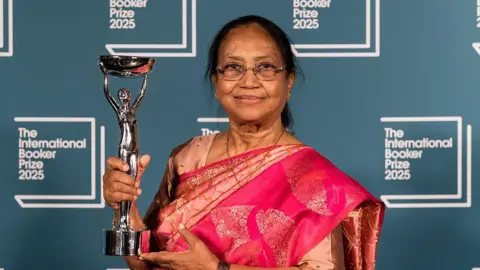In a moment that resonates deeply within literary circles, Indian writer, lawyer, and activist Banu Mushtaq has made history by winning the International Booker Prize for her short story anthology, "Heart Lamp." This landmark achievement marks the first time a book written in the Kannada language, predominant in the southern Indian state of Karnataka, has received this prestigious honor. The anthology, featuring a collection of 12 short stories penned by Mushtaq over three decades from 1990 to 2023, was translated into English by Deepa Bhasthi and poignantly delves into the struggles faced by Muslim women in the region.
Mushtaq's recognition builds upon the success of her fellow author Geetanjali Shree, whose work "Tomb of Sand," translated from Hindi by Daisy Rockwell, won the prize in 2022. While Mushtaq's literary voice has long resonated with book lovers, the Booker International win amplifies the attention on her extensive oeuvre, which reflects the social and cultural challenges confronting women influenced by religious conservatism and patriarchal norms.
An evocative review from the Indian Express encapsulates Mushtaq's unique literary strength: "In a literary culture that rewards spectacle, 'Heart Lamp' insists on the value of attention — to lives lived at the edges, to unnoticed choices, to the strength it takes simply to persist." Banu Mushtaq's journey began in a modest town in Karnataka where she grew up in a Muslim community. As the daughter of a government employee, education was prioritized; her father enrolled her in a convent school at the age of eight, where she learned Kannada, the state's official language. Despite the challenges, she embraced the language for her literary expression.
Her writing career took off despite numerous barriers, including societal expectations pushing young women towards marriage and motherhood. Mushtaq's early literary endeavors coincided with personal struggles, including the mental health challenges she faced after marriage. Her candid reflections reveal how moments of despair led her to defy constraints and fight for her identity as a writer.
Mushtaq’s characters in "Heart Lamp" resonate with her own experiences of resistance and resilience. "In mainstream Indian literature, Muslim women are often flattened into metaphors — silent sufferers or tropes in someone else’s moral argument. Mushtaq refuses both," states the Indian Express. Throughout her career, Mushtaq's activism and literary voice have drawn threats, including a fatwa issued against her for advocating women’s rights within mosques.
Yet, her resolve remains unshaken; she openly challenges versions of religious interpretation that suppress women's voices. "Society has changed a lot, but the core issues remain the same. Even though context evolves, the struggles of women and marginalized communities continue," she articulated in an interview.
Her impressive body of work includes other notable milestones, such as winning the Karnataka Sahitya Academy Award and the Daana Chintamani Attimabbe Award. Recently, Mushtaq's translated collection "Haseena and Other Stories" also earned the esteemed PEN Translation Prize, further establishing her as a formidable presence in contemporary literature. As Mushtaq’s voice continues to resonate in the literary world, her groundbreaking achievements pave the way for aspiring writers in Kannada and beyond.


















